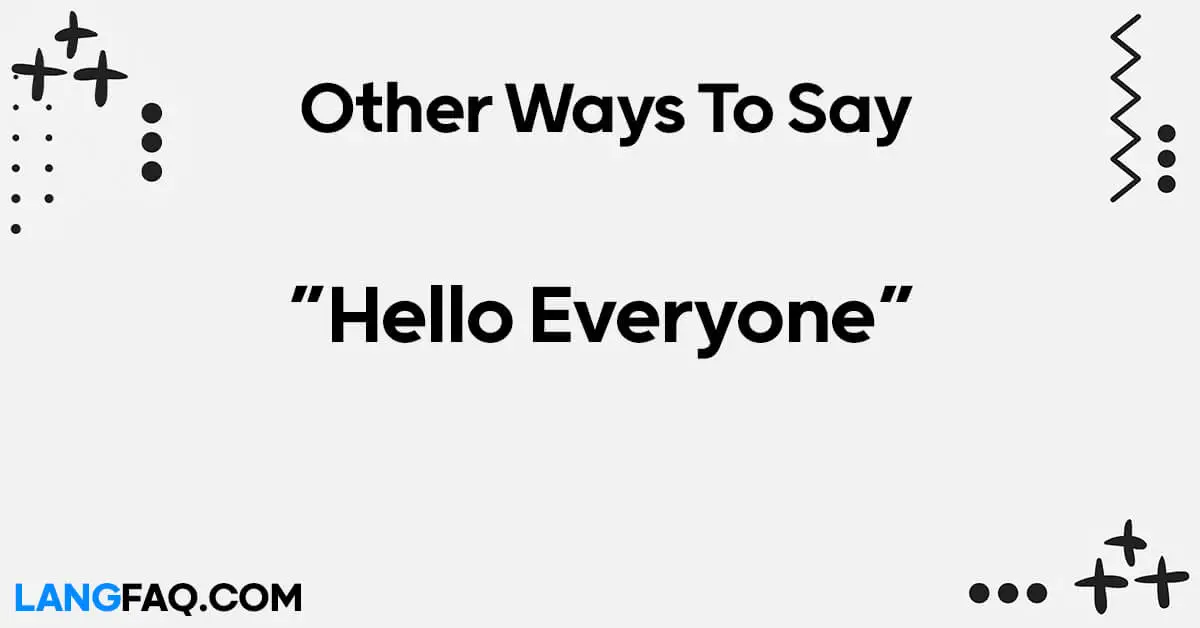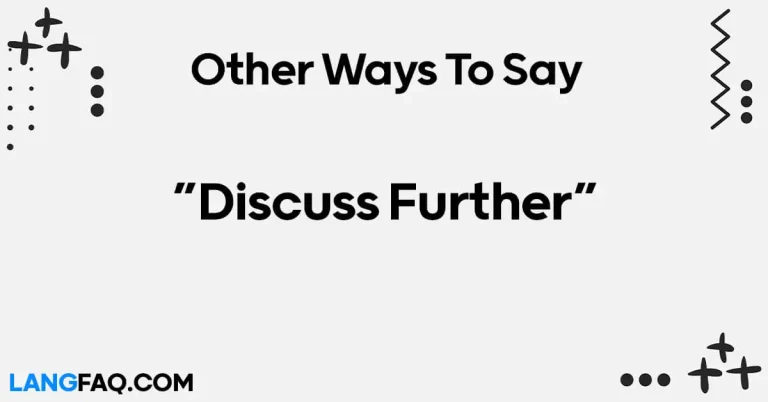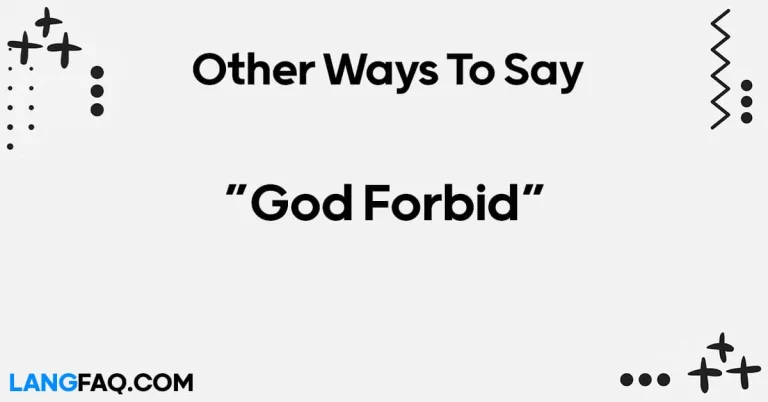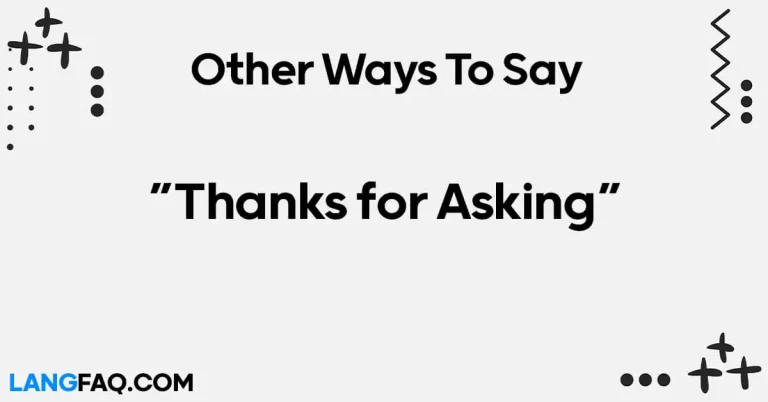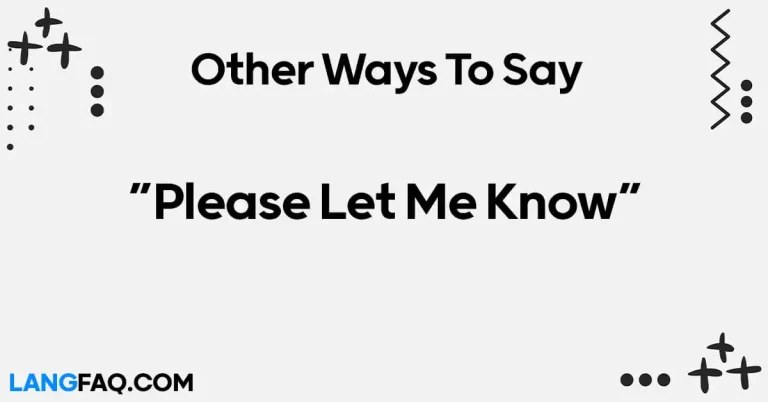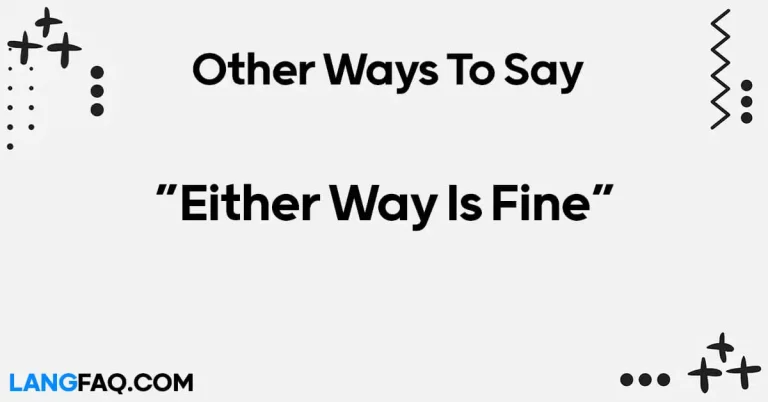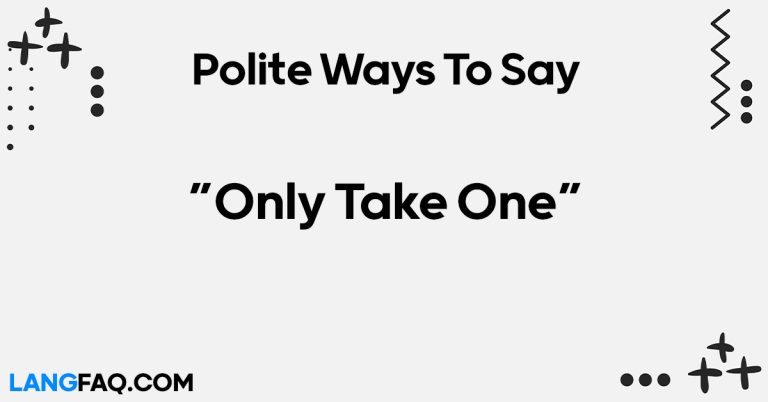Greetings are the cornerstone of human interaction, reflecting our diverse cultures and creating connections. In this article, we delve into the realm of warm salutations, presenting you with 12 other ways to say “Hello Everyone.” Embark on a journey to elevate your greetings and make every interaction memorable.
12 Other Ways to Say “Hello Everyone”
Here are 12 other ways to say “Hello Everyone”:
- Greetings, all!
- Hey there, everybody!
- Hi, folks!
- Good day, everyone!
- Howdy, all!
- Salutations, everybody!
- Aloha, everyone!
- What’s up, folks?
- Bonjour, tout le monde! (French for “Hello, everyone!”)
- Hola, amigos y amigas! (Spanish for “Hello, friends!”)
- Namaste, everyone!
- Yo, team!
Is It Correct to Say “Hello Everyone”?
Yes, “Hello Everyone” is a correct and widely accepted way to greet a group of people. It is a polite and inclusive greeting suitable for various settings, both formal and informal. The word “everyone” in this context refers to all the individuals present, making it an inclusive and friendly salutation.
This phrase is commonly used in emails, presentations, meetings, or any situation where you want to address a group collectively. It sets a positive tone and implies that your message or greeting is intended for each person in the audience.
In more formal settings, you might choose variations like “Good day, everyone” or “Greetings, everyone” for added formality. However, “Hello Everyone” remains a versatile and widely used expression for addressing a diverse audience.
Professional Mail Example With “Hello Everyone”
Subject: Exciting Updates and Team Briefing
Hello Everyone,
I trust this message finds you well. As we navigate through our ongoing projects, I wanted to share some exciting updates and important information that will contribute to our collective success.
Firstly, I’d like to express my gratitude for the dedication and hard work each one of you has put into our recent endeavors. Your commitment has been instrumental in achieving our goals.
Now, let’s dive into the updates:
- Project Milestones: We’ve successfully reached several key milestones in Project Alpha. Kudos to the team for their collaborative efforts.
- Upcoming Deadlines: As we move forward, please be aware of the upcoming deadlines outlined in the attached document. Your timely contributions are crucial to maintaining our project timeline.
- Team-building Session: In light of our recent achievements, we’re planning a team-building session next Friday. It will be a great opportunity for some relaxation and camaraderie.
I encourage everyone to review the attached materials for more detailed information. If you have any questions or require clarification on any point, feel free to reach out.
Thank you once again for your hard work and dedication. Together, we’re achieving remarkable milestones.
Best regards,
[Your Name] [Your Position] [Your Company]
Greetings, All!
In the vast landscape of greetings, the phrase “Greetings, all!” stands as a versatile and formal way to address a group of people. Whether in a professional setting or a social gathering, this expression exudes a sense of politeness and inclusivity.
When to Use:
- Formal Setting: Perfect for business meetings, presentations, or any situation where a touch of formality is required.
- Social Events: Ideal for addressing a diverse crowd, ensuring everyone feels acknowledged.
Example Sentence: “Greetings, all! We are gathered here today to discuss the upcoming projects and share our insights.”
Variations:
- Colleagues: “Greetings, team!”
- Friends: “Hey, everyone!”
- Mentor-Mentee: “Greetings, mentees and mentors!”
Grammar/Usage Tip: Ensure to follow “Greetings, all!” with a comma. It sets the tone for a formal and well-structured communication.
Dictionary Insight: According to the Cambridge Dictionary, “greetings” is an expression of a polite or friendly wish for someone’s health and happiness.
Pros:
- Universally accepted and understood.
- Creates an atmosphere of respect and professionalism.
Cons:
- May sound too formal in very casual settings.
Email Sample:
Subject: Greetings to All – Team Meeting Tomorrow
Dear Team,
Greetings, all! I hope this email finds you well. We have an important team meeting scheduled for tomorrow at 10 AM. Please come prepared with your updates and insights. Looking forward to a productive session.
Best regards,
[Your Name]
Hey There, Everybody!
Adding a touch of informality and friendliness, “Hey there, everybody!” is a warm and engaging way to greet a group. It breaks down barriers, making everyone feel comfortable and welcome.
When to Use:
- Informal Gatherings: Perfect for casual events, friends, or any situation where a laid-back atmosphere is encouraged.
- Team Building: Ideal for fostering a sense of camaraderie among colleagues.
Example Sentence: “Hey there, everybody! Welcome to our weekend barbecue. Grab a seat, and let’s enjoy some good food and company.”
Variations:
- Colleagues: “Hey team, everybody ready for the presentation?”
- Friends: “Hey, everybody! Movie night at my place tonight?”
- Mentor-Mentee: “Hey there, everybody in the mentorship program!”
Grammar/Usage Tip: “Hey there, everybody!” is casual but maintain professionalism based on the context. Avoid in highly formal situations.
Dictionary Insight: While “hey” is often an informal greeting, its use can convey friendliness and approachability.
Pros:
- Establishes a friendly and approachable atmosphere.
- Suitable for various informal settings.
Cons:
- Might be perceived as too casual in formal settings.
Email Sample:
Subject: Hey There, Everybody! Team Outing Next Week
Hey Team,
Hope this message finds you all in high spirits. We’re planning a team outing next week, and I’d love your input on the destination. Reply with your suggestions, and let’s make it a memorable day!
Cheers,
[Your Name]
Hi, Folks!
In the realm of friendly and approachable greetings, “Hi, folks!” takes center stage. This versatile expression strikes a balance between informality and politeness, making it suitable for various social settings.
When to Use:
- Casual Meetings: Perfect for friends, family, or acquaintances in informal gatherings.
- Community Events: Ideal for addressing a diverse group in a community setting.
Example Sentence: “Hi, folks! Thanks for joining us at the community potluck. Let’s enjoy the delicious food and each other’s company.”
Variations:
- Colleagues: “Hi, team! Quick update on our project progress.”
- Friends: “Hi, folks! Movie night at my place this Friday?”
- Mentor-Mentee: “Hi, everyone in the mentorship program! Exciting news to share.”
Grammar/Usage Tip: “Hi, folks!” is a casual greeting suitable for various settings. Use it when you want to convey friendliness without being overly formal.
Dictionary Insight: The term “folks” is an informal way of referring to people, often used to create a sense of familiarity.
Pros:
- Strikes a balance between friendliness and formality.
- Inclusive and suitable for diverse groups.
Cons:
- Might be too casual for certain professional environments.
Email Sample:
Subject: Hi, Folks! Team Update and Reminders
Hi Team,
Just a quick note to update everyone on our progress and remind you of the upcoming deadlines. Check your emails for detailed information. Thanks for your dedication!
Best regards,
[Your Name]
Good Day, Everyone!
For a touch of formality with a positive twist, “Good day, everyone!” serves as a timeless and universally accepted greeting. It sets a positive tone while maintaining a level of professionalism.
When to Use:
- Professional Meetings: Perfect for business settings, meetings, or presentations.
- Public Speaking: Ideal for addressing a larger audience in a positive and inclusive manner.
Example Sentence: “Good day, everyone! I’m thrilled to be here to discuss our upcoming initiatives and hear your valuable input.”
Variations:
- Colleagues: “Good day, team! Let’s make today a productive one.”
- Friends: “Good day, friends! How about a weekend hike?”
- Mentor-Mentee: “Good day, everyone in the mentorship program! Exciting mentorship opportunities ahead.”
Grammar/Usage Tip: “Good day, everyone!” is a formal greeting best suited for professional environments. Ensure the positivity aligns with the context.
Dictionary Insight: According to the Cambridge Dictionary, “good day” is a friendly and polite expression used when greeting people.
Pros:
- Conveys positivity and professionalism.
- Universally accepted in various formal settings.
Cons:
- Might be perceived as too formal in very casual situations.
Email Sample:
Subject: Good Day, Everyone! Important Updates
Dear Team,
Good day, everyone! Please take a moment to review the latest updates in the attached document. Your feedback is highly appreciated.
Kind regards,
[Your Name]
Howdy, All!
Stepping into the realm of informal and friendly greetings, “Howdy, all!” brings a touch of Western charm to your interactions. Perfect for creating a laid-back and approachable atmosphere, this expression is particularly popular in regions where a cowboy spirit is celebrated.
When to Use:
- Casual Gatherings: Ideal for friends, family, or informal events where a relaxed vibe is appreciated.
- Western-themed Occasions: Perfect for events with a Western or cowboy theme.
Example Sentence: “Howdy, all! Welcome to the backyard barbecue. Grab a chair, enjoy the food, and let’s have a good ol’ time together.”
Variations:
- Colleagues: “Howdy, team! Quick check-in on our ongoing projects.”
- Friends: “Howdy, friends! Saturday night bonfire at my place?”
- Mentor-Mentee: “Howdy, everyone in the mentorship program! Exciting mentorship opportunities ahead.”
Grammar/Usage Tip: “Howdy, all!” is a casual and regional greeting. Use it in settings where a relaxed and friendly tone is appropriate.
Dictionary Insight: “Howdy” is a colloquial expression derived from the phrase “How do you do?” It is informal and often associated with Western or Southern American English.
Pros:
- Injects a friendly and laid-back atmosphere.
- Adds a touch of regional charm to your greetings.
Cons:
- Might be perceived as too informal in certain professional settings.
Email Sample:
Subject: Howdy, Team! Quick Update and Cheers to Progress
Howdy Team,
Just a quick email to share the latest project updates. Great work everyone! Looking forward to more successes together.
Best regards,
[Your Name]
Salutations, Everybody!
For those moments when you want to infuse a sense of sophistication into your greetings, “Salutations, everybody!” emerges as an eloquent and formal expression. It carries an air of grace and is perfect for situations where a touch of elegance is appreciated.
When to Use:
- Formal Gatherings: Ideal for events with a more refined atmosphere, such as galas, ceremonies, or upscale occasions.
- Professional Settings: Suitable for addressing colleagues or clients in a polished manner.
Example Sentence: “Salutations, everybody! It is my honor to welcome you to this distinguished event. May the evening be filled with joy and camaraderie.”
Variations:
- Colleagues: “Salutations, team! Let’s delve into our agenda for today’s meeting.”
- Friends: “Salutations, dear friends! A weekend getaway is in the planning. Who’s in?”
- Mentor-Mentee: “Salutations to everyone in the mentorship program! Exciting opportunities lie ahead.”
Grammar/Usage Tip: “Salutations, everybody!” carries a formal tone. Reserve it for occasions where sophistication is valued.
Dictionary Insight: According to the Cambridge Dictionary, “salutations” is a formal expression of greeting or goodwill.
Pros:
- Evokes a sense of elegance and formality.
- Ideal for upscale events and professional settings.
Cons:
- May sound too formal in very casual or informal settings.
Email Sample:
Subject: Salutations, Team! Important Announcement
Dear Team,
Salutations to each of you. I am pleased to share a significant announcement regarding our upcoming projects. Please read the attached memo for details.
Kind regards,
[Your Name]
Aloha, Everyone!
Transporting us to the beautiful islands of Hawaii, “Aloha, everyone!” brings a tropical and laid-back vibe to your greetings. Perfect for creating a relaxed and friendly atmosphere, this expression is ideal for casual events and gatherings.
When to Use:
- Casual Events: Perfect for beach parties, barbecues, or any informal setting.
- Positive Environments: Suitable for creating a cheerful and welcoming atmosphere.
Example Sentence: “Aloha, everyone! Welcome to our luau-themed party. Grab a lei, enjoy the food, and let the tropical vibes take over.”
Variations:
- Colleagues: “Aloha, team! Let’s dive into our projects with enthusiasm.”
- Friends: “Aloha, friends! Planning a beach day this weekend. Who’s in?”
- Mentor-Mentee: “Aloha to everyone in the mentorship program! Exciting times lie ahead.”
Grammar/Usage Tip: “Aloha, everyone!” carries a friendly and tropical tone. Use it in settings where a relaxed and positive atmosphere is desired.
Dictionary Insight: “Aloha” is a Hawaiian word commonly used for both greeting and farewell. It also embodies the spirit of love, peace, and compassion.
Pros:
- Infuses a tropical and positive atmosphere.
- Adds a touch of cultural richness to your greetings.
Cons:
- May be too informal for certain professional environments.
Email Sample:
Subject: Aloha, Team! Celebrating Success and Looking Ahead
Aloha Team,
Celebrating our recent successes and looking forward to future achievements together. Please join me for a brief team celebration during lunch.
Warm regards,
[Your Name]
What’s Up, Folks?
For a casual and friendly greeting that resonates with modern colloquialism, “What’s up, folks?” is a go-to expression. It brings a sense of informality and openness, making it suitable for a variety of settings.
When to Use:
- Informal Gatherings: Ideal for friends, family, or casual events.
- Team Check-ins: Suitable for addressing colleagues in a laid-back work environment.
Example Sentence: “What’s up, folks? Ready for a chill evening filled with good company and laughter?”
Variations:
- Colleagues: “What’s up, team? Quick check-in before we start the day.”
- Friends: “Hey, folks! What’s up for the weekend? Any exciting plans?”
- Mentor-Mentee: “What’s up, everyone in the mentorship program? Updates and guidance session tomorrow.”
Grammar/Usage Tip: “What’s up, folks?” is an informal and colloquial greeting. Use it in settings where a casual and friendly tone is appropriate.
Dictionary Insight: The phrase “What’s up” is an informal way of asking how someone is or what they are doing.
Pros:
- Creates an informal and friendly atmosphere.
- Suitable for a wide range of casual settings.
Cons:
- May sound too informal in certain professional or formal environments.
Email Sample:
Subject: What’s Up, Team? Quick Update and Team-Building Plans
Hey Team,
What’s up? Just a quick email to update you on our recent achievements and discuss upcoming team-building plans. Your input is valuable!
Cheers,
[Your Name]
Bonjour, Tout le Monde! (Hello, Everyone!)
Bringing a touch of French sophistication to your greetings, “Bonjour, tout le monde!” adds an elegant flair to your interactions. Perfect for formal occasions or when you want to infuse a bit of international charm.
When to Use:
- Formal Events: Ideal for elegant gatherings, ceremonies, or upscale occasions.
- Cultural Celebrations: Suitable for events with a French or international theme.
Example Sentence: “Bonjour, tout le monde! It’s a pleasure to welcome you to this soirée. May this evening be filled with joy and meaningful connections.”
Variations:
- Colleagues: “Bonjour, team! Let’s commence our meeting with enthusiasm.”
- Friends: “Bonjour, mes amis! Planning a French-themed dinner this weekend. Who’s in?”
- Mentor-Mentee: “Bonjour to everyone in the mentorship program! Exciting opportunities await us.”
Grammar/Usage Tip: “Bonjour, tout le monde!” carries a formal and international tone. Use it in settings where an elegant and sophisticated atmosphere is desired.
Dictionary Insight: According to the Cambridge Dictionary, “Bonjour” is a French word used as a friendly greeting, especially in the morning.
Pros:
- Adds an international and elegant touch to your greetings.
- Conveys a sense of sophistication and culture.
Cons:
- May be perceived as too formal for very casual settings.
Email Sample:
Subject: Bonjour, Team! Commencement of New Projects
Bonjour Team,
Exciting times lie ahead as we commence our new projects. Please review the attached document for details and be prepared for our kickoff meeting.
Best regards,
[Your Name]
Howdy, Partners!
Infusing a bit of Western charm into your greetings, “Howdy, partners!” creates a friendly and approachable atmosphere. Ideal for informal gatherings or when you want to add a touch of Western flair to your interactions.
When to Use:
- Casual Events: Perfect for barbecues, picnics, or any laid-back setting.
- Team-Building: Suitable for addressing colleagues in a relaxed work environment.
Example Sentence: “Howdy, partners! Gather ’round for some good food, good company, and a whole lot of fun. Let the good times roll!”
Variations:
- Colleagues: “Howdy, team! Quick check-in before we dive into the day’s tasks.”
- Friends: “Howdy, partners in crime! Planning a weekend camping trip. Who’s up for an adventure?”
- Mentor-Mentee: “Howdy to everyone in the mentorship program! Exciting mentorship sessions coming up.”
Grammar/Usage Tip: “Howdy, partners!” is a casual and regional greeting. Use it in settings where a relaxed and friendly tone is appropriate.
Dictionary Insight: “Howdy” is a colloquial expression often associated with Western American English, derived from the phrase “How do you do?”
Pros:
- Adds a friendly and approachable atmosphere.
- Infuses a touch of Western charm into your greetings.
Cons:
- May be too informal for certain professional settings.
Email Sample:
Subject: Howdy, Team! Midweek Boost and Team Lunch Plans
Howdy Team,
Just a quick email to boost your spirits midweek. Also, we’re planning a team lunch this Friday. Your input on the restaurant is welcomed!
Cheers,
[Your Name]
Namaste, Everyone!
Bringing a touch of mindfulness and respect to your greetings, “Namaste, everyone!” is a beautiful expression rooted in Indian culture. Ideal for creating a serene and harmonious atmosphere, it fosters a sense of connection and goodwill.
When to Use:
- Spiritual Gatherings: Perfect for yoga classes, meditation sessions, or any spiritual events.
- Mindfulness Meetings: Suitable for addressing a group with a focus on harmony and unity.
Example Sentence: “Namaste, everyone! As we gather for this meditation session, let us collectively embrace peace, gratitude, and positive energy.”
Variations:
- Colleagues: “Namaste, team! Let’s approach our projects with a spirit of collaboration and positivity.”
- Friends: “Namaste, dear friends! How about a weekend retreat for some mindfulness and relaxation?”
- Mentor-Mentee: “Namaste to everyone in the mentorship program! Let’s embark on this journey of growth and learning together.”
Grammar/Usage Tip: “Namaste, everyone!” carries a spiritual and respectful tone. Use it in settings where creating a serene and harmonious atmosphere is desired.
Dictionary Insight: According to the Cambridge Dictionary, “namaste” is a traditional Indian greeting or gesture of respect.
Pros:
- Fosters a sense of mindfulness and unity.
- Conveys respect and positive energy.
Cons:
- May be perceived as too spiritual for certain casual settings.
Email Sample:
Subject: Namaste, Team! Mindfulness Session Announcement
Namaste Team,
Exciting news! We’re introducing a weekly mindfulness session during lunch breaks. Your presence is encouraged for a serene and rejuvenating experience.
Warm regards,
[Your Name]
Hola, Amigos y Amigas! (Hello, Friends!)
Injecting a bit of Spanish flair into your greetings, “Hola, amigos y amigas!” is a lively and friendly expression. Perfect for creating a vibrant and inclusive atmosphere, it adds a touch of cultural richness to your interactions.
When to Use:
- Social Gatherings: Ideal for parties, celebrations, or any lively event.
- Multicultural Meetings: Suitable for addressing a diverse group with a mix of cultures.
Example Sentence: “Hola, amigos y amigas! Welcome to our fiesta. Let’s celebrate friendship, good times, and the joy of being together.”
Variations:
- Colleagues: “Hola, team! Ready for an exciting brainstorming session?”
- Friends: “Hola, dear friends! Saturday night salsa dancing? Let’s spice things up!”
- Mentor-Mentee: “Hola to everyone in the mentorship program! Exciting mentorship sessions coming your way.”
Grammar/Usage Tip: “Hola, amigos y amigas!” carries a lively and friendly tone. Use it in settings where creating a vibrant and inclusive atmosphere is desired.
Dictionary Insight: “Hola” is a Spanish word commonly used to greet someone.
Pros:
- Adds a lively and inclusive touch to your greetings.
- Infuses a bit of cultural richness into your interactions.
Cons:
- May be perceived as too informal in certain professional settings.
Email Sample:
Subject: Hola, Team! Exciting News and Team-Building Event
Hola Team,
Exciting news! We’ve achieved our quarterly goals. Let’s celebrate with a team-building event this weekend. Your input is crucial!
Cheers,
[Your Name]
FAQs
Q: Can I use these greetings in a formal setting? A: Absolutely! While some are more casual, there are suggestions for formal and professional settings as well.
Q: Are these greetings suitable for virtual meetings? A: Certainly! Many of these greetings can be adapted for virtual spaces, adding a touch of warmth to online interactions.
Q: How can I remember all these greetings? A: Start with a few that resonate with you, and gradually incorporate more into your daily interactions. Practice makes perfect!
Q: Do these greetings work in different cultures? A: Yes, many greetings have cross-cultural appeal. However, always be mindful and respectful of cultural nuances.
Q: Can I use playful greetings in a serious environment? A: While it depends on the context, it’s advisable to gauge the atmosphere before using playful greetings in more serious settings.
Q: Are there greetings suitable for specific times of the day? A: Absolutely! The article includes greetings tailored for different times, ensuring appropriateness in various situations.
Conclusion
Mastering the art of greetings opens doors to meaningful connections and positive interactions. With these 12 other ways to say “Hello Everyone,” you have the tools to make every greeting memorable. Embrace diversity, spread joy, and watch as your interactions flourish with newfound warmth and authenticity.

